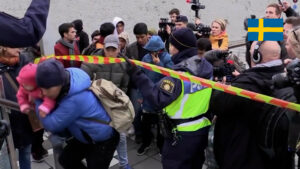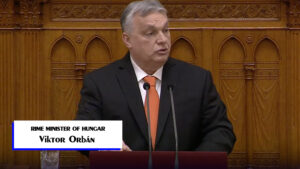INTRODUCTION
In recent years, Europe has witnessed a significant resurgence in support for conservative and right-wing political parties. This phenomenon reflects a growing dissatisfaction among citizens with traditional European leadership, which appears to prioritize external interests over the welfare of its people. This revival is fueled not only by cultural apprehensions but also by economic anxieties stemming from prolonged stagnation. European citizens are increasingly frustrated with what they perceive as the incompetence of leftist governments in managing immigration and addressing economic challenges. Many Europeans feel their governments have mishandled immigration, allowing a flood of migrants without considering the consequences. This has led to cultural erosion and safety concerns, with migrants often isolated and contributing little while taking advantage of welfare benefits. In some areas, locals were forced out as migrants took over, creating separate communities.

Across Europe, conservative and right-wing parties weave a compelling narrative that resonates with voters on multiple fronts. They staunchly oppose immigration, critique the European Union, and passionately advocate for national sovereignty. Their dedication to safeguarding cultural identity serves as a rallying point, creating a powerful connection with citizens. These political entities deftly address apprehensions surrounding globalization, economic unpredictability, and the erosion of cultural heritage. In the face of an uncertain world, they emerge as beacons of stability and order, promising a future that resonates with the concerns of the electorate.
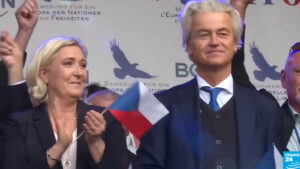
Sweden Democrats (Sweden):
In Sweden, the Swedish Democrats made significant gains, becoming the second-largest party in parliament. This breakthrough came after the party purged itself of extreme elements and adopted a more mainstream image. By brokering agreements with the centre-right bloc, the Swedish Democrats exerted influence on government policy for the first time in the country’s history, particularly on issues such as crime, migration, and energy.
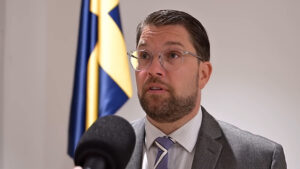
The party’s platform revolves around nationalism, stricter immigration controls, and Euroskepticism, appealing to those who feel marginalized by globalization and societal changes. Party leader Åkesson’s efforts to rebrand the party have been notable, replacing its previous logo with an anemone and distancing it from its racist and violent past. Despite accusations of harbouring violent racists and Nazi sympathizers, Åkesson introduced a “zero tolerance” policy against racism and extremism within the party.
The Sweden Democrats’ electoral success mirrors the growing concerns about immigration in Sweden, with approximately half a million asylum seekers welcomed in the past decade. With projections indicating around 20% of the vote in the upcoming election, Åkesson has emerged as a key adversary of Prime Minister Stefan Löfven, capitalizing on anti-immigration sentiments among voters, particularly amidst the influx of asylum seekers. Åkesson’s leadership continues to shape the political landscape in Sweden, reflecting the party’s evolving influence and resonance with a significant portion of the electorate.
Marine Le Pen’s National Rally (France):
Marine Le Pen’s vision for the National Rally revolves around reinforcing French identity, sovereignty, and national pride. She has consistently advocated for stricter immigration policies, emphasizing the need to protect French culture and values. Her party’s platform includes Euroskepticism and opposition to the European Union’s influence. As a presidential candidate, Marine Le Pen seeks to address the concerns of those who feel left behind by globalization and rapid societal changes. While her party has faced accusations of xenophobia and anti-Semitism, she continues to rally her supporters, positioning the National Rally as a significant force in French politics.
Despite falling short in the presidential election, Le Pen capitalized on anti-establishment sentiment and dissatisfaction with Macron’s government to make significant gains in the country’s legislature. With Le Pen’s party emerging as the main opposition to Macron’s government, French politics experienced a notable rightward shift, with implications for future governance and policymaking.
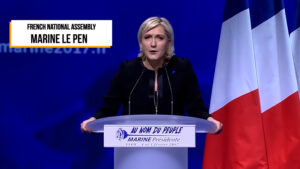
Hungary: Orban’s Resilience
Hungary, under the leadership of Viktor Orban, exemplifies the resilience of far-right politics in the face of external pressures. Orban’s tenure as prime minister has been marked by a relentless commitment to defending Hungary’s perceived national interests and sovereignty, often at odds with the European Union’s agenda. Central to Orban’s political narrative is a staunch opposition to EU policies on immigration, which he portrays as a threat to Hungary’s cultural identity and security. By framing himself as a defender of national sovereignty against perceived external encroachments, Orban has tapped into deep-seated anxieties about globalization and demographic change, resonating with voters who feel marginalized or left behind by economic and social transformations.
Party for Freedom (Netherlands):
Geert Wilders’ Party for Freedom in the Netherlands strongly advocates for anti-immigration policies and expresses scepticism towards the EU. With a focus on national identity and cultural preservation, they have become a major force in Dutch politics. Wilders is best known for his populist, anti-immigration, and criticism of Islam, as well as his Euroscepticism. His views have made him a controversial figure both in the Netherlands and abroad. Since 2004, he has been under armed police protection at all times. Raised a Roman Catholic, Wilders left the church during his coming of age. His travels to Israel and the Arab world significantly influenced his political views.

In the recent Dutch elections, Wilders’ Freedom Party secured a surprising victory, winning 37 seats out of 150 in the lower house, surpassing other parties. His signature proposals include a binding referendum on leaving the European Union, withdrawal from international climate obligations, and a massive reduction in immigration. While he aims to be part of the next administration, it remains to be seen how many of his policies he can implement through coalition agreements.
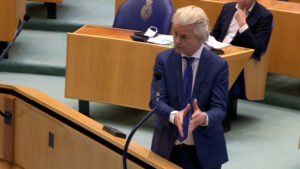
Italy’s League:
Giorgia Meloni’s leadership marks Italy’s first far-right-led administration since World War II, symbolizing the League’s rapid ascent and dedication to conservative values. Some of the League’s key policies include advocating for a 15% flat tax rate, proposing offshore “hot spots” for processing asylum seekers, prioritizing internal security with increased spending, and reforming Italy’s political system to a French-style presidential model. Despite internal differences, especially within the Padanian nationalist faction, the League maintains a robust political base, particularly in northern regions like Veneto and Lombardy.

Conclusion:
The rise of far-right and right-wing parties in Europe reflects a profound discontent among citizens with established political systems and leadership. As these parties gain traction, European leaders must reassess their priorities and address the concerns of their people. Ignoring the grievances of citizens in favour of external interests only fuels the rise of extremism and division. To foster a more inclusive and stable Europe, leaders must prioritize the needs and aspirations of their citizens above all else. If you found this information valuable, don’t forget to watch my YouTube video for more in-depth analysis on this topic: https://youtu.be/uRVUo0hqc5M. Remember, Stay Informed, Stay Engaged.

